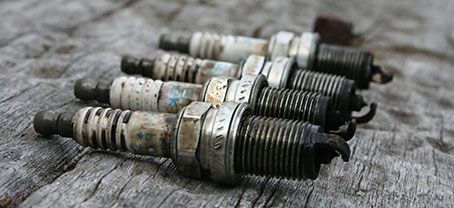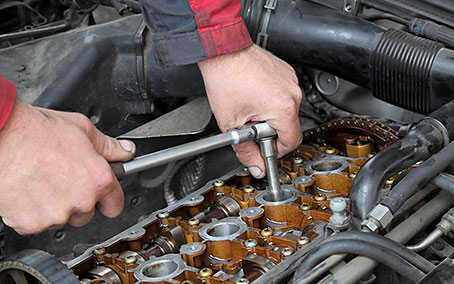When Do Your Spark Plugs Need Replacing?
Sometimes it depends on the type of spark plugs you have and the manufacturer. In general, replacement should be between 30K and 120K miles. We will go over how to know when your spark plugs need to be replaced.
Spark plugs play an important role in distributing power to fuel engines. These plugs deliver electricity from the engine’s ignition system and then create a small bolt of lightning to ignite the air and fuel mixture sprayed into each cylinder between compression and power strokes.
Unlike diesel engines that utilise compression to ignite the air/fuel mixture, spark plugs are used for engines running on alternative fuels like ethanol or other blends.
The best way to describe this action of spark plugs firing off is similar to a miniature bolt of lightning. As it’s a known fact that lightning bolts are destructive in nature, you should consider these miniature bolts going off in your engine. Over time, your engine will take a toll on spark plugs.
In this article, we will address commonly asked questions such as how often do you need to replace your spark plugs? We will look at ten of the best-selling vehicles over the past few years and show a range of recommendations for changing spark plugs based on the type of plugs chosen by engineers. The intervals include 30k, 60k, 100k, and 120k miles.
We’ll start by understanding how spark plugs operate and how they wear out.
How Spark Plugs Operate
All spark plugs are designed with an exterior shell that covers an inner central core made of metal. This core is known as the centre electrode or just electrode. There is another metal piece called a ground electrode which protrudes from the bottom of the threaded area, then curves around and stops directly under the centre electrode. The distance between these two points is referred to as a gap. Electricity travels between these two points whenever the spark plug fires.
The metal used to coat the tip of the ground electrode depends on the different types of spark plugs including nickel, platinum, copper, double platinum, silver, and iridium.
The centre electrode receives its power through an ignition coil. Many newer vehicles feature one coil for each cylinder, the older model of cars rely on a single coil connected to an ignition distributor which feeds the spark plugs through a set of spark plug wires.
Why Spark Plugs Wear Out
It doesn’t matter which metal is used to coat the spark plug tips, it will gradually wear out over time as the engine is driven. As the coating wears down, the gap between the centre electrode and the ground electrode will get wider which, in turn, reduces the effect of the spark.
The lifespan for spark plugs is based on the assumption that these plugs are in top tune and experiencing ideal running conditions during the entire period of their life. In reality, improper combustion can cause excessive ethanol mixed in by petrol stations, incorrect air/fuel mixtures, cold weather conditions, too low octane fuel, or other issues. All these factors take a toll on the life of spark plugs. During short trips when engine temperatures are low can lead to foul-ups of spark plugs due to a build-up of carbon on the tips. Also, if the engine starts to wear, it will allow oil into the combustion chamber which will cause spark plugs to become fouled up by the oil.
If it’s been a good amount of time since you have changed your spark plugs, they are probably in worse shape than you think. Even if the recommended mileage has not been reached, you should pay close attention to how your car is running. Keep an eye out for warning signs that spark plugs are at the end of their life. Worn spark plugs can create rough engine idling, misfires, hard engine starts, reduced power, and the consumption of higher fuel. Most newer vehicles have a check engine warning light that will come on if misfires are present after three or four consecutive starts.
If you have experienced any of these negative conditions, we strongly advise you to pull out one of the spark plugs and take a closer look at it.
If your engine has spark plug wires instead of individual ignition coils, look closely to see what condition these wires are in as you remove them to have access to the spark plugs. In their prime, wires might feel crispy in your hands or come apart when you pull on them. Another test, pull on the wires to examine the engine compartment at night with the engine idling. Any signs of glowing or sparking from the wires that means the current is escaping from the insulation.
Manufacturers may or may not give a recommended interval for replacement of spark plug wires but, in general, a good set should last 60,000 miles but can alter given the circumstances.
One of the leading reasons for replacing the catalytic converter is caused by unburned fuel pouring out of the exhaust. Although there are other reasons, in many cases worn-out spark plugs are at fault. If you consider the cost for a catalytic converter replacement is expensive, staying on top of replacing your spark plugs will save you from a lot of heartache and expense.
Other Factors That Affect Spark Plugs
The tip of the spark plug should be comparably clean. If you notice oil residue on the tip, it could mean you have an internal oil leak. If you find oil on the plug and the engine is running okay, look for the source of the oil. If you have to put off a certain repair, be prepared to change oil-fouled spark plugs a lot more often.
As mentioned earlier, if you drive your car mostly on short trips where engine temperatures remain low, it will foul up spark plugs because of carbon build up on the tips. If driving short distances is average for you, change your spark plugs before the recommended time frame. Also, carbon build up can be caused by a clogged air filter or fuel injectors that are dirty due to poor-quality fuel. Best practice, occasionally take your car on a high-speed motorway drive.
Another important point, you should replace your spark plugs more often instead of waiting for a serious problem to arise because you have left the spark plugs in place in the cylinder head for a very long time. It comes down to this, spark plugs can chemically react with the metal in the cylinder head which will cause the plugs becoming frozen in place. If this happens, the plugs will be very difficult to remove or in some cases impossible to remove without breaking them apart. That will lead to extra labour and cost to get them removed. Please note that aluminium cylinder heads are even more prone to this problem.
When To Replace Spark Plugs
It’s a good idea to check and replace a few remaining engine service items on a regular basis. With new, expensive cars on the horizon, you should replace air filters, fuel filters, and spark plugs. Set up a good schedule based on time or mileage and replace these items all at the same time.
How easy or difficult it will be to have access to the spark plugs depends on the age of the vehicle. For older vehicles, simply open the hood and the plugs are right there. Just remove the plug wire before placing a socket on them.
For newer vehicles, open the bonnet and find a large plastic cover with no signs where the plugs are located. On some models, the plastic cover pops off revealing the plugs. Once you remove the coil pack you will have access to the plugs. In other cases, getting to the plugs will take some work. You have to remove the additional shields, covers, brackets, etc.
If your engine still has the original plugs and it’s time for service on coil packs, fuel injectors or valve cover gaskets, this is the perfect time to inspect the plugs as disassembly is already done.
If you have good access to the plugs, the best way to check them is to inspect them physically. Outside of any recommended mileage by the manufacturer and the manual recommends replacement at 30,000 or 60,000 miles, inspect the condition of the plugs when you reach two-thirds of the mileage.
If you are dealing with longer service intervals of 100,000 or more, check at the halfway mark to see how things look. If the vehicle is running well, check again at the third-quarter mark. Any time you see dirty spark plugs, go ahead and replace them. Given the low cost for new plugs, it would be well worth your time to replace them.
Also, considering the low cost of spark plugs, don’t buy the cheapest plugs you can find only settle for the best for your vehicle.
Conclusion
Understanding how spark plugs work in your car gives you an advantage and the possibility of potentially fixing any problem in a timely manner. If you are not mechanically minded or inclined, then it’s always advisable to contact a professional technician to attend to checking and changing your spark plugs in order to avoid any issue escalating.
For car servicing and repairs in and around Manchester city centre and North Manchester, Oldham, Bury, Bolton, Rochdale, Stalybridge etc. you can count on Servicing Master. You can get a quick repair or service quote from a local premium garage close to you by using our simple car service quote form. We also offer a collection and drop off service. A convenient, friendly and affordable service, try Servicing Master once and you’ll never go back. Give us a call now on 0161 302 0201. Or simply book your car service now.
Get A Quote Now
Why waste any more time searching for a reputable professional garage wth a good rate. Simply click the Get Started button below to complete our quick and easy quote form, we’ll do all the work for you and there’s no obligation.
Hassle Free!
These guys do what they say on the tin. I work for NHS so I am usually always at work these guys collected it while I worked, liaised via email as i couldn’t answer the phone.
Carried out the work and dropped it back off for me, Happy with the service and the nice touch at the end vehicle came back nice and clean!
30 Jan 2019
Top service, knew straight away what the problem was. Had it back next day which was great, glad I’ve found a garage I can use in the future would defiantly recommend. Even gave my car a wash.
Had my car service and mot with Bury branch. Excellent service kept me posted with everything they were doing. Professional, friendly and helpful definitely recommend them. Thanks.
EASY FROM THE START!
Booked online, great realistic price, none of this cheap drag you in and shake you down when you get there. Car collected from work, serviced and mot all done and straight forward, I needed an additional bulb which they rung me and told me.
Car delivered before I finished work and they even gave it a long awaited wash and vacc Lol!
All done from my desk at work defiantly be using them for my wife and daughters vehicles!
30 Jan 2019
Great people to deal with. Trusted with my family’s cars for many many years. Great service, go the extra mile. Thoroughly recommend for anyone looking for work on their car whatever the marque.
Just a quick line, I have finally found a garage where I have complete confidence. Professional and informative, Lisa and Mike are a pleasure to deal with. Thank you.




